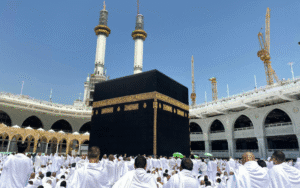Major and Minor Sins in Islam: A Guide to Avoiding Them

Almighty Allah created human beings for His worship. In this worldly life, it is a servant’s duty to remain obedient by following His commands. However, when a person disobeys Allah and defies His commands, they are considered a sinner and will face severe punishment in the Hereafter for their transgressions. While humans are inherently capable of good, they often struggle to abstain from sin. Many sins can nullify a person’s hard-earned good deeds. Understanding the distinction between major and minor sins in Islam is therefore crucial, making it essential to not only perform righteous acts but also to strive wholeheartedly to avoid sin. This effort is often more virtuous than many voluntary acts of worship.
A person once asked Abdullah ibn Abbas (RA), “Which person is more beloved to you: one with few sins and few good deeds, or one with many sins and many good deeds?” He replied, “I consider nothing equal to the virtue of being safe from sin.” Hasan al-Basri (Rah) used to say, “A servant can perform no worship better than abstaining from what Allah has forbidden.” This is why the Prophet Muhammad (ﷺ) said, “Abstain from the forbidden, and you will be the best of worshippers.”
This article provides a detailed discussion on the definition of sin, its types, its causes, its grave consequences, and practical steps on how to avoid sin in Islam, all in the light of the Quran and Hadith.
Chapter One: The Nature of Sin
The Definition of Sin
In essence, sin refers to corruption, misdeeds, injustice, or any act that contradicts divine scripture. In Arabic, sin is referred to by terms such as الإثم (Al-Ithm), المعصية (Al-Ma’siyah), and الذنب (Adh-Dhanb). Technically, sin encompasses any word, action, or belief—whether minor or major, private or public—that is forbidden in the Shari’ah.
The scholar Raghib al-Isfahani stated, “Sin is any action that distances a person from divine reward (thawab).
” The Messenger (ﷺ) explained, “Righteousness is good character, and sin is what wavers in your heart, and you would dislike for people to learn of it.”
(Sahih Muslim, Hadith No: 2553)
Major and minor sins in Islam
Sin is primarily divided into two categories: Kabirah (major) and Saghirah (minor). In the Holy Quran, Allah says:
وَوُضِعَ الْكُتَابُ فَتَرَى الْمُجْرِمِينَ مُشْفِقِينَ مِمَّا فِيهِ وَيَقُولُونَ يَا وَيْلَتَنَا مَالِ هَٰذَا الْكُتَابِ لَا يُغَادِرُ صَغِيرَةً وَلَا كَبِيرَةً إِلَّا أَحْصَاهَا
“And the record [of deeds] will be placed [open]… They will say, ‘Oh, woe to us! What is this book that leaves nothing small or great except that it has enumerated it?'”
(Surah Al-Kahf, 18:49)
1. Major Sins (Kabirah)
These are transgressions that necessitate a hadd (prescribed punishment) in this life or are associated with threats of Hellfire, divine curses, or the wrath of Allah. Examples include shirk (associating partners with Allah), sorcery, murder, consuming interest (riba), consuming unlawful things (haram), and fleeing from the battlefield. Major sins are only forgiven through sincere repentance in islam (tawbah).
The Messenger (ﷺ) highlighted some of the gravest sins in the sight of Allah, such as:
Associating partners with Him, killing one’s child out of fear of poverty, and committing adultery with one’s neighbor’s wife.
(Sahih al-Bukhari, Hadith No: 4477)
2. Minor Sins (Saghirah)
These include all other sins that are not classified as major and do not have a specified punishment. Minor sins can be expiated through various acts of worship. The Messenger (ﷺ) said,
“The five [daily] prayers, from one Jumu’ah to the next, and from one Ramadan to the next, will be an expiation for the sins committed in between, so long as the major sins are avoided.”
(Sahih Muslim, Hadith No: 233)
However, the Messenger (ﷺ) warned against taking minor sins lightly. He said,
“Beware of minor sins. They are like a group of people who stopped in a valley… Indeed, when minor sins accumulate, they will surely destroy a person.”
(Musnad Ahmad, Hadith No: 22808)
Thus, the classification of major and minor sins in Islam helps a believer prioritize their spiritual efforts.
When Minor Sins Become Major
Under certain conditions, even minor sins can escalate into major ones. These include:
- Persistence: Continuously engaging in a minor sin. Ibn Abbas (RA) noted, “No sin remains major with sincere repentance, and no sin remains minor with persistence.”
- Publicizing: Openly speaking about a sin after committing it.
- Trivializing: Considering a sin to be insignificant or unimportant.
- Commission by a Role Model: When a respected leader or public figure commits a minor sin, its gravity increases due to their influence.
Chapter Two: The Causes of Sin
1. Following Personal Desires (Hawa) Acting on whims and impulses is a primary gateway to sin. Allah says:
وَمَنْ أَضَلُّ مِمَّنِ اتَّبَعَ هَوَاهُ بِغَيْرِ هُدًى مِّنَ اللَّهِ
“And who is more astray than one who follows his own desire without guidance from Allah?”
(Surah Al-Qasas, 28:50)
2. Ignorance Without religious knowledge, one cannot properly understand and adhere to Allah’s commands. Ignorance leads people down misguided paths and into transgression.
3. Satan’s Temptations Satan is humanity’s avowed enemy. Allah warns:
وَلَا تَتَّبِعُوا خُطُوَاتِ الشَّيْطَانِ ۚ إِنَّهُ لَكُمْ عَدُوٌّ مُّبِينٌ
“And do not follow the footsteps of Satan. Indeed, he is to you a clear enemy.”
(Surah Al-Baqarah, 2:168)
4. Corrupting Company The Messenger (ﷺ) advised,
“A person is on the religion of his close friend, so let each of you look to whom he befriends.”
(Sunan Abu Dawood, Hadith No: 4833)
5. Heedlessness (Ghaflah) Being neglectful of the remembrance of Allah makes a person vulnerable to sin. Allah states:
اقْتَرَبَ لِلنَّاسِ حِسَابُهُمْ وَهُمْ فِي غَفْلَةٍ مُّعْرضُونَ
“[The time of] their account has approached for the people, while they are in heedlessness turning away.”
(Surah Al-Anbiya, 21:1)
6. Worldly Ambitions and False Hopes Excessive worldly aspirations distract from the Hereafter. Allah says:
ذَرْهُمْ يَأْكُلُوا وَيَتَمَتَّعُوا وَيُلْهِهِمُ الْأَمَلُ ۖ فَسَوْفَ يَعْلَمُونَ
“Let them eat and enjoy themselves and be distracted by [false] hope, for they are going to know.”
(Surah Al-Hijr, 15:3)
7. The Uncontrolled Gaze Failing to control one’s gaze is a root cause of moral decay. Allah commands:
قُل لِّلْمُؤْمِنِينَ يَغُضُّوا مِنْ أَبْصَارِهِمْ وَيَحْfَظُوا فُرُوجَهُمْ ۚ ذَٰلِكَ أَزْكَىٰ لَهُمْ
“Tell the believing men to lower their gaze and guard their private parts. That is purer for them.”
(Surah An-Nur, 24:30)
8. Idle Time The Messenger of Allah (ﷺ) said,
“There are two blessings which many people waste: health and free time.”
(Sahih al-Bukhari, Hadith No: 6412)
9. The Uncontrolled Tongue Engaging in useless and harmful speech is a significant source of sin. When asked what leads people to Hell most often, the Messenger (ﷺ) replied,
“The mouth and the private parts.”
(Sunan al-Tirmidhi, Hadith No: 2004)
Chapter Three: The Consequences of Sin
Part 1: Impact on the Heart
1. The Heart Becomes Dark and Hardened
The Messenger of Allah (ﷺ) taught that when a person sins, a black spot appears on their heart. If they repent, the heart is polished clean. But if they persist, the spot grows until it covers the entire heart in rust.
(Sunan al-Tirmidhi, Hadith No: 3334)
2. Loss of Self-Respect and Modesty The Messenger (ﷺ) said,
“From the teachings of the earlier Prophets that has reached people is: ‘If you feel no shame, then do as you wish.'”
(Sahih al-Bukhari, Hadith No: 6120)
3. Inability to Distinguish Good from Evil Under the influence of sin, the heart can become so corrupted that a person begins to perceive good as evil and evil as good.
4. A Constricted Heart Allah says:
وَمَن يُرِدْ أَن يُضِلَّهُ يَجْعَلْ صَدْرَهُ ضَيِّقًا حَرَجًا كَأَنَّمَا يَصَّعَّدُ فِي السَّمَاءِ
“…And whomever He wills to send astray – He makes his breast tight and constricted as though he were climbing into the sky.”
(Surah Al-An’am, 6:125)
Part 2: Impact on Worldly Life
1. Diminished Provisions and Blessings (Barakah) Disobedience to Allah strips blessings from one’s wealth and life.
2. Deprivation from Allah’s Mercy and Aid Allah says:
وَمَا أَصَابَكُم مِّن مُّصِيبَةٍ فَبِمَا كَسَبَتْ أَيْدِيكُمْ وَيَعْفُو عَن كَثِيرٍ
“And whatever disaster strikes you – it is for what your hands have earned; and He pardons much.”
(Surah Ash-Shura, 42:30)
3. A Life of Hardship and Anxiety Allah says:
وَمَنْ أَعْرَضَ عَن ذِكْرِي فَإِنَّ لَهُ مَعِيشَةً ضَنكًا
“And whoever turns away from My remembrance – indeed, he will have a constricted life.”
(Surah Taha, 20:124)
4. Increase in Disease and Natural Disasters The Messenger (ﷺ) warned,
“When immorality becomes rampant in a people, plagues and illnesses that were unknown to their ancestors will spread among them.”
(Sunan Ibn Majah, Hadith No: 4019)
Part 3: Impact on One’s Faith (Deen)
1. Weakening and Corruption of Faith (Iman) The Messenger (ﷺ) stated,
“A person who commits adultery is not a believer at the moment of the act, a person who drinks alcohol is not a believer at the moment of drinking, and a person who steals is not a believer at the moment of stealing.”
(Sahih al-Bukhari, Hadith No: 2475)
2. Deprivation of Sacred Knowledge (Ilm) Imam al-Shafi’i (Rah) famously said, “Knowledge is a light from Allah, and the light of Allah is not bestowed upon a sinner.”
3. Nullification of Good Deeds Certain grave sins can completely erase a person’s hard-earned good deeds. Reflecting on these consequences helps one appreciate the gravity of both major and minor sins in Islam.
4. Unanswered Prayers The Messenger of Allah (ﷺ) described a man whose food, drink, and clothing were all from unlawful sources and then asked,
“How, then, could his supplications be answered?”
(Sahih Muslim, Hadith No: 1015)
Part 4: Impact on Society
1. The Spread of Corruption and Turmoil Allah says:
ظَهَرَ الْفَسَادُ فِي الْبَرِّ وَالْبَحْرِ بِمَا كَسَبَتْ أَيْدِي النَّاسِ
“Corruption has appeared throughout the land and sea by [reason of] what the hands of people have earned…”
(Surah Ar-Rum, 30:41)
2. Subjugation by Enemies When a nation is disobedient to Allah, He may allow its enemies to overpower it.
3. Erosion of Social Bonds Sin fosters animosity, hatred, and fragmentation within a community.
4. Collective Punishment When sin becomes widespread and righteous people fail to forbid it, a collective punishment from Allah may descend upon the entire society.
Chapter Four: How to avoid sin in Islam – The Path to a Purer Life
1. Strengthen Your Faith (Iman) Allah asks:
أَلَمْ يَأْنِ لِلَّذِينَ آمَنُوا أَن تَخْشَعَ قُلُوبُهُمْ لِذِكْرِ اللَّهِ وَمَا نَزَلَ مِنَ الْحَقِّ
“Has the time not come for those who have believed that their hearts should become humbly submissive at the remembrance of Allah and what has come down of the truth?”
(Surah Al-Hadid, 57:16)
2. Cultivate a Sense of Divine Watchfulness Allah reminds us:
وَاعْلَمُوا أَنَّ اللَّهَ يَعْلَمُ مَا فِي أَنفُسِكُمْ فَاحْذَرُوهُ
“And know that Allah knows what is within yourselves, so beware of Him.”
(Surah Al-Baqarah, 2:235)
3. Practice Self-Accountability (Muhasabah) Allah advises:
يَا أَيُّهَا الَّذِينَ آمَنُوا اتَّقُوا اللَّهَ وَلْتَنظُرْ نَفْسٌ مَّا قَدَّمَتْ لِغَدٍ
“O you who have believed, fear Allah. And let every soul look to what it has put forth for tomorrow.”
(Surah Al-Hashr, 59:18)
4. Occupy Yourself with Good Deeds Allah says:
إِنَّ الْحَسَنَاتِ يُذْهِبْنَ السَّيِّئَاتِ
“Indeed, good deeds do away with misdeeds.”
(Surah Hud, 11:114)
The Power of Sincere repentance in islam
5. Engage in the Remembrance of Allah (Dhikr) Allah tells us:
أَلَا بِذِكْرِ اللَّهِ تَطْمَئِنُّ الْقُلُوبُ
“Unquestionably, by the remembrance of Allah hearts are assured.”
(Surah Ar-Ra’d, 13:28)
6. Strive Earnestly to Abandon Sin Allah promises:
وَالَّذِينَ جَاهَدُوا فِينَا لَنَهْدِيَنَّهُمْ سُبُلَنَا
“And those who strive for Us – We will surely guide them to Our ways.”
(Surah Al-Ankabut, 29:69)
True repentance in Islam involves not just regret but a firm resolve to not repeat the sin, coupled with striving in Allah’s path.
7. Resist Your Desires The Messenger of Allah (ﷺ) listed “following one’s desires” as one of three destructive habits.
8. Befriend the Pious The Messenger of Allah (ﷺ) said,
“Do not accompany anyone but a believer, and let none but the pious eat your food.”
(Sunan Abu Dawood, Hadith No: 4833)
9. Live by the Quran The Messenger (ﷺ) said,
“One part of this Quran is in Allah’s Hand and the other is in your hands. Hold firmly to it, and you will never be destroyed or go astray.”
(Tabarani, Sahih al-Jami’, Hadith No: 4473)
10. Supplicate to Allah (Du’a) Allah says:
وَقَالَ رَبُّكُمُ ادْعُونِي أَسْتَجِبْ لَكُمْ
“And your Lord says, ‘Call upon Me; I will respond to you.'”
(Surah Ghafir, 40:60)
11. Nurture a Sense of Shame Before Allah The Messenger (ﷺ) advised,
“Be shy of Allah just as you would be shy of a righteous man from your community.”
(Bayhaqi, Shu’ab al-Iman, Hadith No: 7372)
12. Fear the Day of Accountability Allah will say:
اقْرَأْ كِتَابَكَ كَفَىٰ بِنَفْسِكَ الْيَوْمَ عَلَيْكَ حَسِيبًا
“‘Read your record. Sufficient is your soul this Day as an accountant against you.'”
(Surah Bani Isra’il, 17:14)
13. Reflect on the Grave Consequences of Sin Ibn al-Jawzi (Rah) wrote, “If the wise were to reflect on spending the rest of their lives in regret for fulfilling a moment’s desire, they would not even approach sin.”
14. Never Belittle a Sin The Messenger of Allah (ﷺ) warned,
“Beware of seemingly insignificant sins, for they accumulate until they destroy a person.”
(Musnad Ahmad, Hadith No: 3808)
15. Remember the Rewards of Abstinence Allah promises:
وَأَمَّا مَنْ خَافَ مَقَامَ رَبِّهِ وَنَهَى النَّفْسَ عَنِ الْهَوَىٰ فَإِنَّ الْجَنَّةَ هِيَ الْمَأْوَىٰ
“But as for he who feared the standing before his Lord and restrained the soul from [unlawful] inclination, then indeed, Paradise will be [his] refuge.”
(Surah An-Nazi’at, 79:40-41)
16. Remember That Your Limbs Will Testify Allah says:
الْيَوْمَ نَخْتِمُ عَلَىٰ أَفْوَاهِهِمْ وَتُكَلِّمُنَا أَيْدِيهِمْ وَتَشْهَدُ أَرْجُلُهُم بِمَا كَانُوا يَكْسِبُونَ
“That Day, We will seal over their mouths, and their hands will speak to Us, and their feet will testify about what they used to earn.”
(Surah Ya-Sin, 36:65)
How to Protect Your Limbs from Sin
- a. Guard Your Gaze: Allah commands believers to lower their gaze. (Surah An-Nur, 24:30)
- b. Guard Your Hearing: In Islam, what is forbidden to say is also forbidden to hear. Describing the believers, Allah says: “And when they hear ill speech, they turn away from it.” (Surah Al-Qasas, 28:55)
- c. Guard Your Tongue: The Messenger (ﷺ) said, “People will be cast into Hell on their faces only because of what their tongues have uttered.” (Sunan al-Tirmidhi, Hadith No: 2616)
- d. Guard Your Mouth: The Messenger (ﷺ) identified the mouth and private parts as the primary causes for entering Hell.
- e. Guard Your Mind and Intentions: The Messenger (ﷺ) stated, “Verily, actions are judged by intentions.” (Sahih al-Bukhari, Hadith No: 1)
Conclusion
Building a sin-free life is a lifelong journey of devotion. Following these guidelines on how to avoid sin in Islam requires unwavering faith, a blend of fear and love for Allah, persistent effort, and constant prayer for His guidance. For anyone who sincerely strives to abandon sin and live a pure life, Allah illuminates the way and makes the path of righteousness easy.
May Allah grant us all the strength to avoid all forms of sin and to live our lives as His devoted and obedient servants. Ameen!
Frequently Asked Questions
What are some of the main causes of sin?
Common causes of sin include following personal desires, ignorance of religious commands, temptations from Satan, keeping bad company, being heedless of Allah, and having excessive worldly ambitions.
What are the consequences of sin?
Sin can have severe consequences, including hardening the heart, leading to a loss of self-respect, and diminishing provisions and blessings in life. It can also weaken one's faith, lead to unanswered prayers, and cause corruption and turmoil in society.
How can I avoid sin in Islam?
To avoid sin, you should strengthen your faith, practice self-accountability, and occupy yourself with good deeds. You can also resist your desires, engage in the remembrance of Allah (Dhikr), befriend pious people, and make sincere supplications to Allah.
Do my limbs testify against me on the Day of Judgment?
Yes, on the Day of Judgment, your hands and feet will speak and testify about what you used to earn. This includes everything you have done with them, which is why it's important to guard them from sin.









